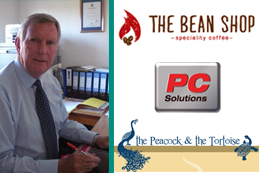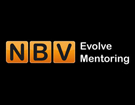- Resources for mentees
- Useful information
- Case studies
- Construction & property
- Consumer products
- Creative services
- Education & training
- Hotels & restaurants
- IT & telecoms
- Manufacturing
- Professional services
- Renewable energy
- Resources for mentors
- Other resources
- Regional events
- Best Practice Toolkit

Take 3 initiative
Mike Rae (shown right), director at Feorlin Ltd, and board member of Fife Alcohol Support Service and Tayside Council on Alcohol, has been a mentor through Business Mentoring Scotland for over four years now.
In March 2012, Mike began mentoring three Perth based businesses as part of the Take 3 initiative of Business Mentoring Scotland – where three business leaders come together to be mentored by a single mentor. Keith Fergie, owner of PC Solutions – a bespoke computer hardware and software supplier and IT consultancy firm; Lorna Bruce, coowner of The Bean Shop - an independent coffee shop specialising in providing unique teas and self-roasted coffees; and Trudy Duffy-Wigman, co-owner of The Peacock and The Tortoise – a specialist quilting, patchwork and haberdashery company; all took advantage of the unique opportunity to obtain advice from a business mentor with over 40 years’ experience in business, and at the same time, share experiences and ideas with other business owners from their peer group. Unsurprisingly, all three owners had different motivations in joining Business Mentoring Scotland, hoping to overcome a range of different challenges and each with their own individual objectives. For each business the eventual outcomes of mentoring also varied, from cost reductions and efficiency improvements to increases in turnover and profitability, but one constant was that Keith, Lorna and Trudy were unequivocal in their praise for mentoring, and to get a more detailed insight into how mentoring really influenced their business performance and prospects, Scottish Chambers of Commerce spoke with all 3 businesses leaders;
Why did you join mentoring?
Keith: “We were approached by someone from the local chamber – just at the right time, it was something we had been looking at doing.”
Lorna: “I spoke with someone from Perth council who suggested mentoring would be good for our business and I`m always open to learning new things.”
Trudy: “When we wrote our business plan we always planned to get as much advice as possible and to get a fresh pair of eyes to look at our business.”
How did the mentoring relationship work?
Keith: “Mike had a framework, some topics/classes we elected to change and some were more flexible.”
Lorna: “John and I would take turns to go along to the meetings, there was a different topic each week and we normally had notes to take away with us. Mike was a charismatic chap and his style of mentoring was quite anecdotal but it made you think about the core issues relevant to your business.”
Trudy: “Mike knows his stuff that is obvious, he discussed business planning issues including marketing and financial plans, and time management.”
Did being mentored affect your business’ finances?
Keith: “We have achieved a 60% increase in efficiency as a direct result of mentoring. Jobs that used to take 3 days now take less than 1 working day. The increase in efficiency definitely led to an increase in profitability and we are in a much better place now.”
Lorna: “We have seen an increase in turnover since being mentored.”
Trudy: “Our financial plans are on track anyway but it was re-assuring to know we were doing things right.”
Did mentoring affect your staffing levels?
Keith: “We took on more staff at first but as we became more efficient we scaled back again.”
Lorna: “We have increased the number of part time staff we have since mentoring and it’s freed up some time for us now that we have twin boys to look after.”
Trudy: “We have taken on another member of staff but we had planned on doing that anyway.”
How did mentoring influence your business’ strategy?
Keith: “We are now more pro-active rather than re-active, our processes are more defined. Now when we get a curve ball we can deal with it whereas before it used to cause mayhem.”
Lorna: “We decided to focus on trade coffee where there were better returns and we also decided to offer a more complete service. We identified our website as the weakest point of our business and we now have a new website that has just launched (http://www.thebeanshop.com), which we expect will increase sales even further.”
Trudy: “Mentoring reinforced to us the importance of having a complete business plan.”
Were there long term effects of being mentored?
Keith: “Mike’s attention to detail in terms of processes better equipped us for growth, for the increase in demand and sales that we experienced. The processes he introduced included staff processes and customer experience feedback, for example – follow up calls to customers after we’d done work for them.”
Lorna: “There was definitely an attitudinal change, we became more analytical and more in tune with the direction the business was going in. After being mentored we felt that our destiny was more in our own hands.”
Trudy: “I used to work for the Dutch equivalent of Scottish Enterprise so I had a sound knowledge of business development issues already, but when it’s your own business at first you’re always nervous, speaking with Mike and other businesses really helped reduce this.”
Would you recommend Business Mentoring Scotland to other businesses?
Keith: “I would highly recommend mentoring to other businesses. We went into it with open expectations and it evolved from there, what Mike discussed was the catalyst, the stimulation.”
Lorna: “Yes it changes your perspective on your business, everyone should do it, mentoring provided us with ideas that we would never have thought of.”
Trudy: “Absolutely, I know a similar programme exists in the Netherlands and Business Mentoring Scotland works just like that one, every business should try it.”







